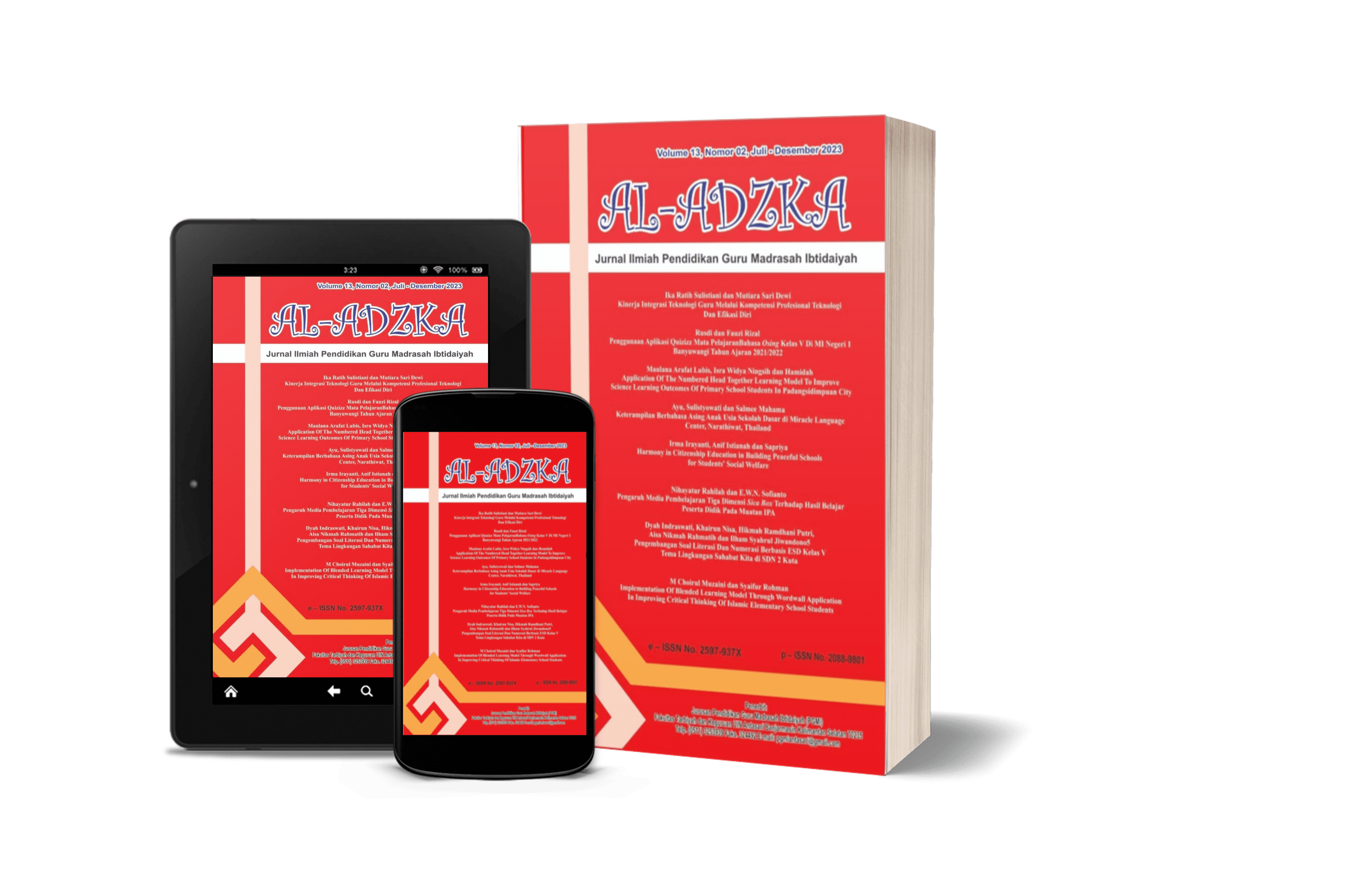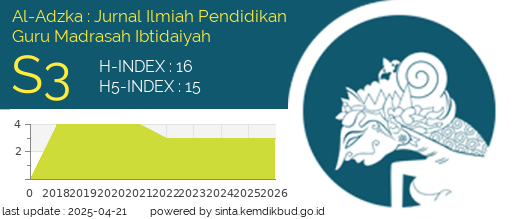Students' Interest in Online-Based Thematic Learning During The Covid-19 Pandemic
DOI:
https://doi.org/10.18592/aladzkapgmi.v11i2.4255Abstract
This research was motivated by the existence of a circular letter from the Minister of Education and Culture regarding the implementation of education policies during the spread of COVID-19, making face-to-face learning in schools stopped and switching to online learning. The purpose of this study was to determine the online learning practices applied by the teacher in thematic learning of MI AU students in Bogor Regency, as well as to determine students' interest in online thematic learning. The object of this research was 65 people, both men and women. The method used in this research is descriptive quantitative method. The data collection technique was carried out using a questionnaire in which the researcher arranged questions related to students' interest in online thematic learning. Furthermore, the questionnaire data were analyzed using descriptive statistics. The results of research on students' interest in online-based thematic learning during the COVID-19 pandemic at MI AU showed student interest with a percentage of 76.22% of the 22 statement items given to students through a questionnaire. The learning practice uses the WhatsApp group application because the application is easy to use by parents. Thus, students' interest in online-based thematic learning shows a very high interest.References
Aini, Q., & Relmasira, S. C. (2018). Penerapan Pembelajaran Tematik Integratif Berbasis Konsevtual untuk Meningkatkan Keaktifan dan Hasil Belajar Siswa Kelas 1 SD. Kajian Teori dan Praktik Pendidikan, 124-132.
Antari, L. (2015). Penggunaan Bahan Ajar Tematik Pembagian untuk Meningkatkan Hasil Belajar di Kelas IIA. Jurnal Pendidikan Matematika FKIP Univ. Muhammadiyah Metro, 22-29.
Arikunto, S. (2006). Prosedur Penelitian Suatu Pendekatan Praktik. Jakarta: Rineka Cipta.
Astini, N. K. (2020). Pemanfaatan Teknologi Informasi dalam Pembelajaran Tingkat Sekolah Dasar pada Masa Pandemi Covid-19. JURNAL LAMPUHYANG.
Darmadi, H. (2018). Optimalisasi Strategi Pembelajaran " Inovasi Tiada Henti Untuk Meningkatkan Kualitas Proses dan Hasil Belajar Peserta Didik". Bogor: Guepedia.
Firman, & Rahman, S. R. (2020). Pembelajaran Online di Tengah Pandemi Covid-19. Indonesian Journal of Educational Science (IJES).
Kartika, H. (2014). Pembelajaran Matematika Berbantuan Software Matlab Sebagai Upaya Meningkatkan Kemampuan Komunikasi Matematis dan Minat Belajar Siswa SMA. Jurnal Pendidikan UNSIKA.
Kemendikbud. (2020). Penyelenggaraan Belajar dari Rumah.
Kemenkes. (2020). Situasi Terkini Perkembangan Coronavirus Disease (COVID-19).
KumparanNews. (2020). Kabupaten Bogor Perpanjang Masa Belajar di Rumah hingga 19 Juni.
Nuryana, A. N. (2020). Dampak Pandemi Covid-19 Terhadap Dunia Pendidikan. Kabar Priangan.
Pakpahan, R., & Fitriani, Y. (2020). Analisa Pemanfaatan Teknologi Informasi dalam Pembelajaran Jarak Jauh di Tengah Pandemi Virus Corona Covid-19. Universitas Bina Sarana Informatika.
Pakpahan, R., & Fitriani, Y. (2020). Analisa Pemanfaatan Teknologi Informasi Dalam Pembelajaran Jarak Jauh di Tengah Pandemi Virus Corona Covid-19. Journal of Information System, Applied, Management, Accounting and Research.
Pratiwi, I. M. (2014). Penerapan Strategi React untuk Meningkatkan Kemampuan Komunikasi Matematis Pada Siswa Sekolah Dasar Materi Bangun Ruang Sederhana. Universitas Pendidikan Indonesia.
Rahman, K. (2019). Dewan Pendidikan di Tengah Pusaran Covid-19. Jurnal Pendidikan Agama Islam.
Riduwan. (2011). Skala Pengukuran Variabel-variabel Penelitian. Bandung: Alfabeta.
Salahudin, A. (2011). Filsafat Pendiidikan. Bandung: Pustaka Setia.
Slameto. (2018). Belajar dan Faktor-faktor yang Mempengaruhi. Jakarta: Rineka Cipta.
Sudjana, N. (2017). Penilaian Hasil Proses Belajar Mengajar. Bandung: Alfabeta.
Sugiyono. (2015). Metode Penelitian Pendidikan. Bandung: Alfabeta.
Sumantri, A. (2020). Metamorfosis Dunia Pendidikan di Masa Pandemi Covid-19. Medcom.id.
Downloads
Published
How to Cite
Issue
Section
License
Authors who publish with this journal agree to the following terms:
- Authors retain copyright and grant the journal right of first publication with the work simultaneously licensed under a Creative Commons Attribution 4.0 International that allows others to share the work with an acknowledgement of the work's authorship and initial publication in this journal.
- Authors are able to enter into separate, additional contractual arrangements for the non-exclusive distribution of the journal's published version of the work (e.g., post it to an institutional repository or publish it in a book), with an acknowledgement of its initial publication in this journal.
- Authors are permitted and encouraged to post their work online (e.g., in institutional repositories or on their website) prior to and during the submission process, as it can lead to productive exchanges, as well as earlier and greater citation of published work.












